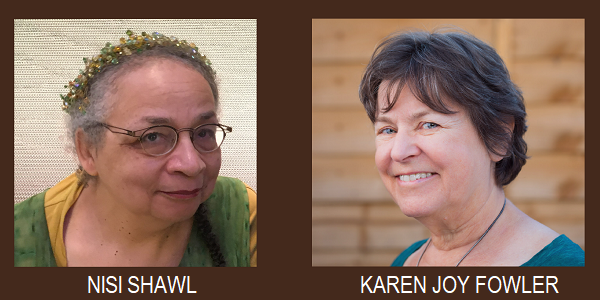I’m amazed and thrilled to announce that my story “Eight Mile and the City” from When Worlds Collide has won the WSFA small press award for short fiction. 
Check it!
This year, the committee got more than 260 stories for initial consideration. They whittled it down to ten finalists, including my story. The finalist list has some heavy-hitters in the SF writing community on it, and there were so many stories anyway, so I wasn’t expecting to win. I had a “It would be great, but no need to get your hopes up” frame of mind. I was in the audience at the award ceremony in Washington DC, and when they announced my story had won, I was floored. I was so surprised, I couldn’t do anything for a moment but stare at the announcer. Joshua Palmatier, one of the editors for the anthology, was sitting next to me, and I could see he was thrilled. In a fit of exuberance, I hugged him, then went up to the podium to get the award. I also gave a short speech. This is what I said:
Thank you, everyone! This is amazing!
This story means a lot to me. Not just because I wrote it, but because of what it means. The main character in “Eight Mile and the City” from When Worlds Collide is gay, but that’s not what the story is about. The story is about a hardboiled detective trying to solve a kidnapping and uncovering his own past as well.
Not that long ago, this story would only have appeared in an anthology of gay fiction and “only”
gotten the attention of the Gaylactic Spectrum Award. This story appears in a fantastic anthology
of wonderful stories that are geared toward all SF readers. It’s not a specialty. It’s not an odd outlier. Instead, it’s one of the family.
We still have further to go, of course, but every step forward gets us one step closer to full inclusion and acceptance. I’m thrilled that my story has become one of those steps.
I do want to thank the committee members for choosing “Eight Mile and the City.” It means so very much! I also need to thank the members of the Untitled Writers Group of Ann Arbor, Michigan–Sarah, MaryBeth, Jonathan, Christian, Diana, Cindy, Ted, Christine P-K, and Christine D–for commentary that improved every line of this story. I want to thank S.C. Butler and Joshua Palmatier for editing When Worlds Collide and buying my story. And I want to thank my husband Darwin McClary for the inspiration I needed to write this piece.
I’m back home now and coasting on euphoria!
The story “Eight Mile and the City” appears in the anthology When Worlds Collide. We have an excerpt below:
We knew she was opportunity because she knocked once and came in. She had a swagger and a set of dagger heels you only see in women south of Eight Mile. A thin line of dark showed at the roots of her carefully golden hair and her lipstick was a strawberry scarlet. She shut the office door behind her and sat in the client chair across from me without asking, her red leather purse perched on her knees like a sleek little lapdog. Seb exchanged a glance with me from his section of the shared Ikea desk we’d salvaged from a burned-out building down on Cass.
“Is this the Eight Mile Detective Agency?” she asked.
Seb leaned back and his chair squeaked. “That’s what it says on the door. You need a detective?”
“Or maybe two.” Her posture hummed with live-wire tension. “I want to hire you to find my son. His name is Samuel Flagg.”
From her purse she removed a paper photograph and passed it over to me. It landed on my desk and I looked down at it without touching. A boy with brown hair, maybe three years old, gazed back up at me with brown eyes. I flipped the photo over to Seb with my fingertips. It was a hell of a flip. My part of the desk looks like the universe a half-second after the Big Bang. But if you stand on it and look down from a distance, you’d see that the chaos makes a wider pattern—these papers sorted by date, those by urgency, others by category. Seb’s desk, on the other hand, is rigid as a general’s asshole. The few objects on his desk look like they’re nailed there. So it was a feat to flip the photo over my chaos to his order.
While Seb examined the photo, I made myself say, “Your name is?” Talking to strangers is the hardest part of my day. Not because I don’t know what to say. I just have to find a way to say it.
“Candace Flagg.” She reached across the desk. “Pleased to meet you.”
I managed not to grimace when I leaned in to shake. Her hand was cool and thin, and when the sleeve of her blue silk coat pulled back, I noticed the scars.
“Andy Faust,” I said, giving my standard opener. “This is my partner in crime prevention, Sebastian. How long has your son been missing?”
She hesitated. “Next week, it’ll be two years.”
Seb’s eyebrows went up. “Have you called the cops about him?”
“Of course. They told me he isn’t missing.”
Now my eyebrows went up. “You got more to say than that?”
“Look. There’s a reason I’m here.” She leaned in again and lowered her voice. “Word out there—” she made a vague gesture at the door and its pebbled glass window that read Eight Mile Detective Agency: We Push the Boundary “—is that you boys have an in with the NokSinn.”
A silence fell over the little office, but it took me a while to notice. Seb sat stone-faced. I looked away from him and swallowed a throatful of nerves.


